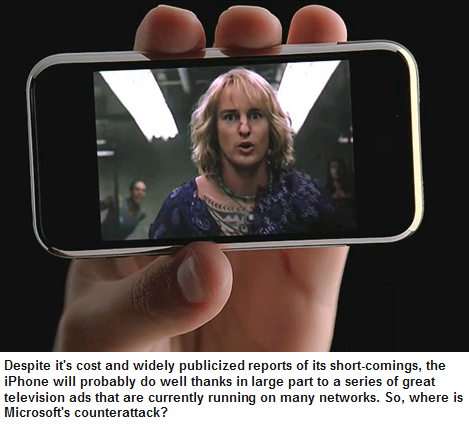With respect to iPhone, Microsoft rolls over and plays dead

You'd have to be hiding under a rock to not know by now that June 29 might as well be called "iDay": the day that Apple's iPhone (provisioned by Cingular) will officially be available for purchase. At $600 each, it's inconceivable to me that there will be lines of sleeping bag and Hibachi toting digerati camped out in front of Cingular stores like the parents that nearly killed each other for Cabbage Patch dolls. The buzz is in no small part due to Apple's advertising blitz -- a large part of which is a television campaign that makes the iPhone look so compelling that even I feel like I want one. Thankfully, I can't have everything I want. But the many discouraging apsects of the iPhone is not really what this blog post is about, or is it? (continued below)
Where the heck is Microsoft? Earlier this year, Microsoft launched the newest version of Windows Mobile (version 6) and there's a slew of devices built on the new mobile OS (we have video of them here) with more coming (like the new HTC touchscreen handset). But even with the new software and gear, the "if we build it, they will come" strategy is not a good one in the face of a foe like Apple. I was equally stymied by Microsoft's inability to grasp the importance of image marketing with its Zune (see: To Win, Zune will need a Bono).
Granted, Windows Mobile still has its fair share of problems. More and more, when I pull out the Motorola Q that I have, I am asked how I like it as they pull out their own Windows Mobile-based device and then the gripes and groans start. But, the iPhone is no picnic either. To me, its public enemy #1 (after its $600 price tag) isn't just the prediction of its horrendous battery life, it's the fact that you can't replace a dead battery with a freshly charged one. So lesson #1 to Microsoft. Maybe the product isn't as polished as you'd like it to be. But that's no reason not to be in the game. Or maybe it is. Maybe Microsoft sees the iPhone as being such a dud that it won't have to do any marketing to offset the potential damage to its Windows Mobile business. But something tells me that's not going to happen.
